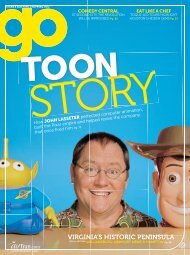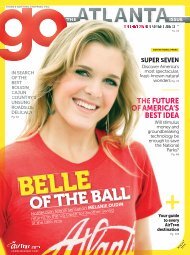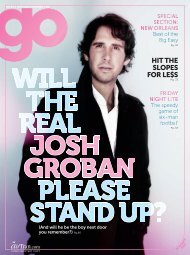Create successful ePaper yourself
Turn your PDF publications into a flip-book with our unique Google optimized e-Paper software.
068<br />
from, says Veronica Volny of Meadow Lark<br />
Farm Dinners in Boulder, CO. The selftrained<br />
chef, along with a few fellow cooks,<br />
gardeners, foragers and preservers, bought<br />
an old school bus and turned it into a<br />
mobile kitchen. Between June and October,<br />
the group serves five-course dinners for 36<br />
people, twice weekly, on 10 local farms.<br />
“For us, and I think for a lot of chefs,<br />
it’s about wanting to taste food at its prime.<br />
Knowing that an ear of corn changes 12<br />
hours after it’s picked, and having the<br />
chance to eat it right away—that’s powerful,”<br />
says Volny, whose menu isn’t set until<br />
the day of each dinner. “We didn’t want to<br />
take the produce to a commissary kitchen<br />
and then bring it back. This way, what we<br />
eat never leaves the field.”<br />
For diners, creating a connection to the<br />
land is a way to fight back against the 20th<br />
century rise of industrial food production.<br />
“In the last five years, more people have<br />
become aware of the industrial food chain<br />
and its impact on the environment,” she<br />
says. “They are seeking alternatives and<br />
ways to support sustainable practices.”<br />
In its basic form, sustainable agriculture<br />
offers a way to raise food that is healthy for<br />
consumers and animals, doesn’t harm the<br />
environment, provides fair wages, and supports<br />
and enhances rural communities.<br />
YOU CAN ALSO EAT RIGHT ON THE<br />
farm at Blue Hill at Stone Barns, a former<br />
Rockefeller estate located 30 miles north of<br />
New York City in Pocantico Hills. Opened<br />
in 2004 and co-owned by Chef Dan Barber—named<br />
the nation’s top toque in <strong>2009</strong><br />
by the James Beard Foundation—the restaurant<br />
has no menu. Instead, the kitchen<br />
creates multi-course “farmer’s feasts”<br />
around the day’s harvest and the diner’s<br />
preferences. Servers explain what’s fresh,<br />
ask for any requests—and the feast begins.<br />
Guests experience the freshest possible<br />
GO MAGAZINE OCTOBER <strong>2009</strong><br />
ingredients, virtually yards from where<br />
they were grown or raised. The five- ($105)<br />
or nine-course ($135) menus always start<br />
with a selection of just-harvested, lightly<br />
dressed baby vegetables.<br />
At the height of the growing season, the<br />
farm’s 23,000-square-foot greenhouse and<br />
22 acres of pasture provide as much as 80%<br />
of the ingredients used in Barber’s kitchens<br />
(he also co-owns Blue Hill in Manhattan’s<br />
Greenwich Village, opened in 2000).<br />
“The recipes are being written in the<br />
field,” says Barber, whose grandmother<br />
owned a family farm in Massachusetts. “I<br />
have yet to find a carrot or a leg of lamb<br />
that tasted good, yet had bad ecological<br />
decisions behind it. It’s not possible. Ultimately,<br />
taste is the most powerful tool in a<br />
chef ’s toolbox. And by seeking better tasting<br />
food, by default we’re making good environmental<br />
decisions. Chefs are fueling the<br />
movement away from commercial farming<br />
because, in our search for delicious food,<br />
we’re influencing the way farmers farm.”<br />
DINING IN THE FIELD IS ON THE<br />
menu for fall at Congress Hall and the Virginia<br />
Hotel in Cape May, NJ. Both hotels will<br />
“Being on the farm<br />
feels like you’re in<br />
another world.”<br />
Traders Point Creamery<br />
feature farm picnics as part of their corporate<br />
retreat programs. Curtis Bashaw, whose<br />
company Cape Resorts Group owns the<br />
hotels and five restaurants (including Ebbitt<br />
Room), also has a 62-acre farm. He first<br />
noticed the rustic tract of deserted farmland<br />
in West Cape May two decades ago. As his<br />
business grew, he kept an eye on it, and<br />
finally bought the long-fallow farm in 2007.<br />
Planted with summer crops like<br />
blueberries, asparagus, tomatoes and strawberries,<br />
along with a large perennial herb<br />
garden, the certified organic farm already<br />
supplies Bashaw’s restaurants with close to<br />
their 50% of seasonal produce. The Ebbitt<br />
Room’s chef, Lucas Manteca, looks forward<br />
to expanding with chickens and pigs next<br />
year. “Once you taste organic food straight<br />
from the source, and understand the process,<br />
it’s hard to go back,” he says.<br />
Due to guests’ enthusiasm for the farm,<br />
organized bike tours are offered twice weekly<br />
in addition to the picnics, which hotel guests<br />
can reserve through the concierge for groups<br />
of six or more. “Being on the farm feels like<br />
you’re in another world,” Bashaw says. “It’s<br />
a connection to the way things used to be.<br />
And we want to be a part of that.”<br />
A COMMITMENT TO PRESERVING<br />
heirloom strains of grains and vegetables—original<br />
strains that haven’t been<br />
manipulated in any way—is what inspired<br />
Sean Brock to start farming a 2.5-acre tract<br />
of Low Country land on Wadmalaw Island,<br />
about 20 miles outside Charleston, SC.<br />
When the executive chef of Charleston’s
















